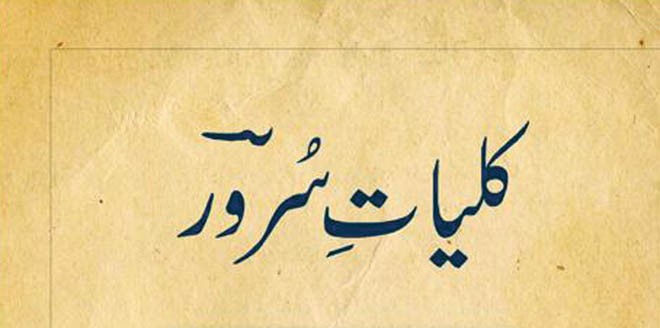
A collection of Suroor Barabankvi’s lyrical and political poems is now available for a wider audience

Suroor Barabankvi wrote poetry in a highly lyrical mode. It was thus no surprise that he also became a very successful lyricist for the films.
Ironically, since film has been a very popular medium, poets who wrote for films become household names and are remembered more by people in the street. In Pakistan, this trend did not really catch on despite serious poets like Habib Jalib having written poems that were meant to be sung by the vocalist and composed for films. But, in India, poets especially those belonging to the Progressive Writers Association as a conscious choice decided to write for films, thus paving way for a much wider audience. They were helped by filmmakers in more ways than one that corresponded to their ideological aim but also for many popular films that were for all intents and purposes mainstream and had a message tagged at the end.
This could have been the reason for Suroor opting for writing songs or lyrics for films, especially since he had migrated to East Pakistan after partition. It seemed the most creative and productive phase of his life. The films made in East Pakistan were different in tone and colour from the films that were made in the western wing with a more somber feel to them. Many of those associated with films there also worked for those made on the Indian side of Bengal.
It was stressed by his friends who have written pieces in his Kulyaat-e Suroor that he was one of the persons responsible for the production of Urdu films in East Pakistan. Such was his influence that he was able to convince producers that there was scope and market for Urdu films. He was proved right because a different kind of Urdu cinema took shape in East Pakistan and films like Nawab Sirajuddaula were made.
It appeared that Suroor Barabankvi in his lifetime had to go through two migrations, one to East Pakistan from United Provinces, now Uttar Pradesh, and then after about twenty odd years again migrating to Karachi with the fall of Dhaka or "the liberation of Bangladesh". It is rare that a person in one lifetime has to go through two migrations; both kind of forced upon and not really a matter of free choice. He had, so it seemed, settled fairly well in East Pakistan where he was recognised and rewarded to make enough for a comfortable life. But the second migration was really tough on him. It had made him lose everything as he barely struggled to survive with his comparative large family. It appears from the forewords written by eminent persons and friends it all probably led to his early and unexpected death in Karachi.
The 1947 migration led to traumatic results and much literature, art and films were created out of it. The attendant death and destruction inspired much artistic expression, but one is not that familiar with the art produced as a consequence of the liberation and the resultant migration of people from East Pakistan. If there is any literature, it must be in Bengali and because of the language barrier one is not really familiar with it.
We are familiar with the ghazals and other such poems based on high lyricisms of Suroor. But the inclusion of ‘Shikast Se Pehley’, a long poem on the 1971 tragedy added another dimension to his poetry and how immediate circumstances cast their shadows on the creative process. Maktaba e Danyal Karachi has in a way published his collected works by including both the books -- Soz e Geeti and Sang e Aftaab.
Faiz wrote about East Pakistan when he went there with an official delegation led by the prime minister himself. It was clear to him that those who were once his friends had become strangers. But with Suroor it is different because he had lived through the holocaust or was actually very close, being the first-hand witness or an immediate victim of it. The way it was received and acted upon or reacted upon is very different from Faiz.
Actually, this dilemma was also faced by progressive writers or poets who subscribed to this view in 1947 as the country was divided on communal lines and the poets/writers were left only to offer apologetic reasons for it like ‘ye daagh daagh ujala, yeh shub guzida sehr’. It was a sea of blood and storm of disruption that swept through them. The same thing happened to Suroor Barabankvi twice because he did not find himself sympathetic to what was happening in East Pakistan, of course, but he must have been seen to be with the oppressors and those who were facilitating the killing fields of Bengal.
The actual problem is how he was being perceived by others, the general public, the man in the street, and it was clear that being Urdu-speaking and a non-Bengali he was seen as an outsider, the same way the progressive writers were seen to be either Muslim or non-Muslim in 1947.
Dum bakhud hoon ab sar e maqtal ye manzar dekh kar
Ke main khood maqtool hoon laikin safe qatil main hoon
Kulyaat-e Suroor Poet: Suroor Barabankvi
Publisher: Maktaba e Danyal Karachi, 2019
Pages: 324
Price: Rs850